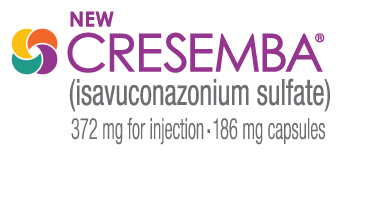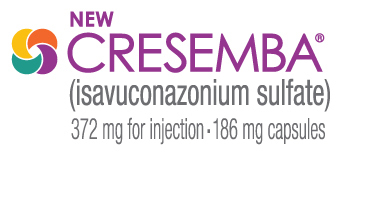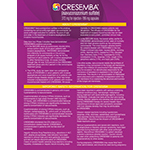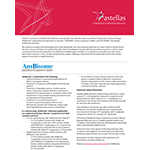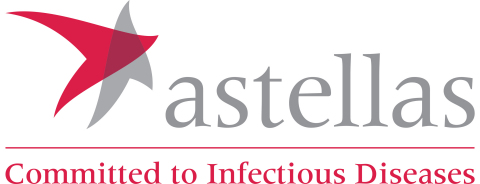NORTHBROOK, Ill.--(BUSINESS WIRE)--Astellas today announced that the U.S. Food and Drug Administration (FDA) has approved its New Drug Application (NDA) for the use of CRESEMBA® (isavuconazonium sulfate), the prodrug for isavuconazole, for patients 18 years of age and older in the treatment of invasive aspergillosis and invasive mucormycosis (also known as zygomycosis). These are life-threatening fungal infections predominantly occurring in immunocompromised patients.
“We’re pleased with the FDA’s approval of CRESEMBA for use in treating patients with these life-threatening infections,” said Bernie Zeiher, M.D., executive vice president, Global Development and therapeutic area head of Infectious Disease at Astellas. “We are proud to be able to offer a new treatment for patients in an area for which there is a significant unmet medical need.”
“It is extremely gratifying to have been a part of the clinical trials of CRESEMBA since inception, knowing patients and their physicians will now have this option,” said Thomas F. Patterson, M.D., FACP, FIDSA, Division of Infectious Diseases chief at The University of Texas Health Science Center at San Antonio and director of the San Antonio Center for Medical Mycology. “CRESEMBA is an important new therapy for physicians treating patients with invasive aspergillosis and invasive mucormycosis fungal infections.”
The safety and efficacy profile of CRESEMBA in patients with invasive aspergillosis and invasive mucormycosis was demonstrated based on data from the CRESEMBA development program. The safety and efficacy profile of CRESEMBA in patients with invasive aspergillosis was demonstrated based on data from two Phase 3 clinical trials in adult patients with invasive fungal infections: SECURE, a randomized, double-blind, active-control study of adult patients with invasive aspergillosis; and VITAL, an open-label non-comparative study of CRESEMBA in adult patients with invasive aspergillosis and renal impairment or in patients with invasive fungal disease caused by other rare fungi.
In the SECURE study (a study of 516 patients), CRESEMBA demonstrated non-inferiority to voriconazole on the primary endpoint of all-cause mortality at day 42 for the treatment of adult patients with invasive aspergillosis or other filamentous fungi. All-cause mortality through Day 42 was 18.6 percent in the CRESEMBA treatment group and 20.2 percent in the voriconazole treatment group.
The safety and efficacy profile of CRESEMBA in patients with invasive mucormycosis was demonstrated based on data from the VITAL study, which included a subpopulation of 37 patients with invasive mucormycosis treated with CRESEMBA. All-cause mortality in CRESEMBA-treated patients was 38 percent. The efficacy of CRESEMBA for the treatment of invasive mucormycosis has not been evaluated in concurrent, controlled clinical trials.
In the SECURE study, the overall safety profile for CRESEMBA demonstrated similar rates of mortality and non-fatal adverse events as the comparator, voriconazole. The most frequent adverse events for patients treated with CRESEMBA in clinical trials were: nausea (26%), vomiting (25%), diarrhea (22%), headache (17%), elevated liver chemistry tests (17%), hypokalemia (14%), constipation (13%), dyspnea (12%), cough (12%), peripheral edema (11%), and back pain (10%).
The recommended loading dose of CRESEMBA is one reconstituted vial or two capsules (372 mg isavuconazonium sulfate equivalent to 200 mg of isavuconazole) every eight hours for six doses (48 hours) via oral or intravenous administration. The recommended maintenance dose is one reconstituted vial or two capsules (372 mg isavuconazonium sulfate equivalent to 200 mg of isavuconazole) once per day via oral or intravenous administration, starting 12 to 24 hours after the last loading dose. Capsules can be taken with or without food. CRESEMBA for injection must be administered through an in-line filter over a minimum of one hour.
The CRESEMBA New Drug Application (NDA) was submitted by Astellas on July 8, 2014. CRESEMBA is being co-developed with Basilea Pharmaceutica International Ltd. Basilea submitted a European Marketing Authorization Application on July 16, 2014 for the treatment of invasive aspergillosis and mucormycosis in adults.
Upon this approval, Astellas will pay a CHF 30 million milestone payment to Basilea Pharmaceutica International Ltd. under their license and co-development agreement.
About Invasive Aspergillosis
Invasive aspergillosis is a life-threatening fungal infection that is seen predominantly in immunocompromised patients, such as patients with leukemia. Invasive aspergillosis is known for high morbidity and mortality.
About Invasive Mucormycosis
Invasive mucormycosis is a rapidly progressing and devastating invasive fungal infection. Invasive mucormycosis is also known for high morbidity and mortality.
About CRESEMBA®
CRESEMBA (isavuconazonium sulfate) is the prodrug containing the active antifungal agent isavuconazole, an azole antifungal indicated for use in the treatment of invasive aspergillosis and invasive mucormycosis.
Important Safety Information for CRESEMBA® (isavuconazonium sulfate)
CRESEMBA is contraindicated in persons with known hypersensitivity to isavuconazole.
Coadministration of strong CYP3A4 inhibitors, such as ketoconazole or high-dose ritonavir (400 mg every 12 hours), with CRESEMBA is contraindicated because strong CYP3A4 inhibitors can significantly increase the plasma concentration of isavuconazole.
Coadministration of strong CYP3A4 inducers, such as rifampin, carbamazepine, St. John’s wort, or long acting barbiturates with CRESEMBA is contraindicated because strong CYP3A4 inducers can significantly decrease the plasma concentration of isavuconazole.
CRESEMBA shortened the QTc interval in a concentration-related manner. CRESEMBA is contraindicated in patients with familial short QT syndrome.
Hepatic Adverse Drug Reactions (e.g., elevations in ALT, AST, alkaline phosphatase, total bilirubin) have been reported in clinical trials and were generally reversible and did not require discontinuation of CRESEMBA. Cases of severe hepatic adverse drug reactions including hepatitis, cholestasis or hepatic failure including death have been reported in patients with serious underlying medical conditions (e.g., hematologic malignancy) during treatment with azole antifungal agents, including CRESEMBA. Evaluate liver tests at the start and during therapy. Monitor patients who develop liver abnormalities during CRESEMBA therapy for severe hepatic injury. Discontinue if clinical signs and symptoms consistent with liver disease develop that may be attributable to CRESEMBA.
Infusion-related reactions including hypotension, dyspnea, chills, dizziness, paresthesia, and hypoesthesia were reported during intravenous administration of CRESEMBA. Discontinue the infusion of CRESEMBA if these reactions occur.
Serious hypersensitivity and severe skin reactions, such as anaphylaxis or Stevens Johnson syndrome, have been reported during treatment with other azole antifungal agents. Discontinue CRESEMBA if a patient develops a severe cutaneous adverse reaction. Caution should be used when prescribing CRESEMBA to patients with hypersensitivity to other azoles.
During pregnancy, CRESEMBA may cause fetal harm when administered, and should be used during pregnancy only if the potential benefit to the patient outweighs the risk to the fetus. Women who become pregnant while receiving CRESEMBA are encouraged to contact their physician.
Following dilution, CRESEMBA intravenous formulation may form precipitate from the insoluble isavuconazole. Administer CRESEMBA through an in-line filter.
The most frequent adverse events among CRESEMBA-treated patients were: nausea (26%), vomiting (25%), diarrhea (22%), headache (17%), elevated liver chemistry tests (16%), hypokalemia (14%), constipation (13%), dyspnea (12%), cough (12%), peripheral edema (11%), and back pain (10%).
The adverse reactions which most often led to permanent discontinuation of CRESEMBA therapy during the clinical trials were: confusional state (0.7%), acute renal failure (0.7%), increased blood bilirubin (0.5%), convulsion (0.5%), dyspnea (0.5%), epilepsy (0.5%), respiratory failure (0.5%), and vomiting (0.5%).
For Full Prescribing Information, please visit here.
About Astellas Infectious Disease
Astellas is committed to the field of infectious diseases. Astellas is expanding the knowledge base of this therapeutic area and empowering physicians to make evidence-based clinical decisions.
Astellas’ proud history of collaborating with investigators around the world provides ideal environments to study compounds that have the potential for significant breakthroughs for patients. In fact, Astellas has performed some of the world's largest clinical trials in fungal infections.
About Astellas
Astellas is a pharmaceutical company dedicated to improving the health of people around the world through provision of innovative and reliable pharmaceuticals. For more information on Astellas, please visit our website at www.astellas.us. Follow us on Twitter at www.twitter.com/AstellasUS. Visit our Facebook page at https://www.facebook.com/?ref=tn_tnmn#!/AstellasUS.

